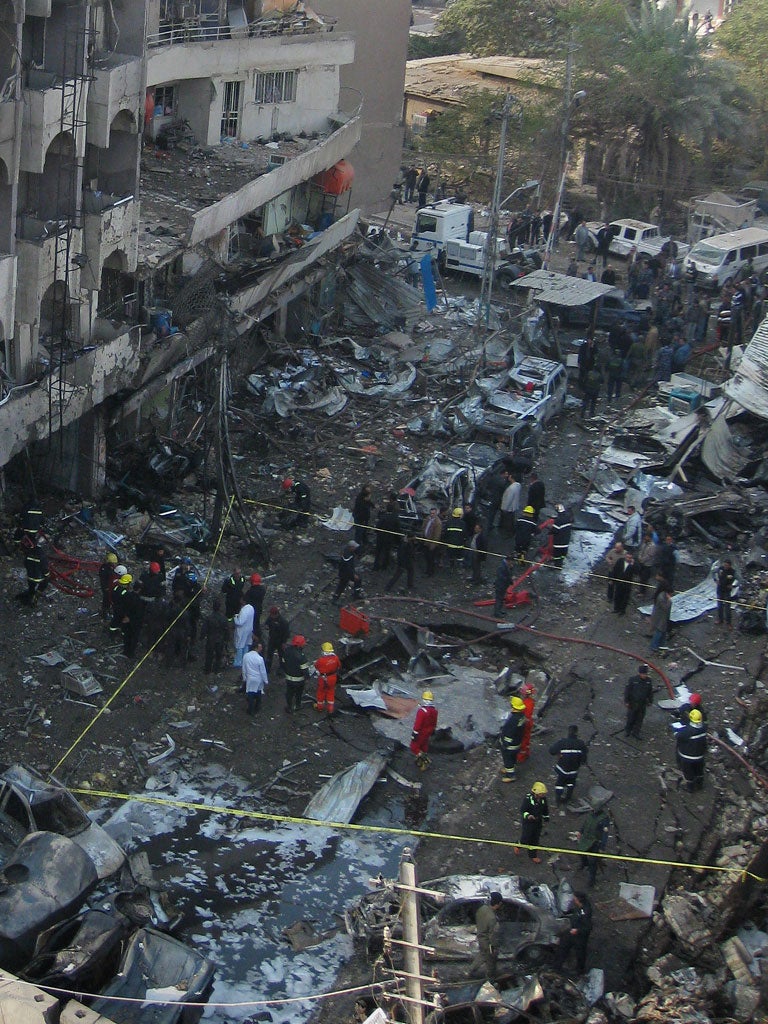Scores killed in multiple bomb attacks in Baghdad
One day, 16 bomb attacks, as country is torn apart by sectarian strife

Your support helps us to tell the story
From reproductive rights to climate change to Big Tech, The Independent is on the ground when the story is developing. Whether it's investigating the financials of Elon Musk's pro-Trump PAC or producing our latest documentary, 'The A Word', which shines a light on the American women fighting for reproductive rights, we know how important it is to parse out the facts from the messaging.
At such a critical moment in US history, we need reporters on the ground. Your donation allows us to keep sending journalists to speak to both sides of the story.
The Independent is trusted by Americans across the entire political spectrum. And unlike many other quality news outlets, we choose not to lock Americans out of our reporting and analysis with paywalls. We believe quality journalism should be available to everyone, paid for by those who can afford it.
Your support makes all the difference.A wave of orchestrated bombings sent plumes of smoke into the air across Baghdad yesterday, killing at least 72 people and injuring more than 200 in the worst violence for months.
There is a growing sense of a sectarian crisis in Iraq as the Shia Prime Minister Nouri al-Maliki tries to arrest his own Sunni Vice-President on charges of running death squads. The threat of escalating sectarian warfare is deepened by the fear among the Iraqi Shia elite that the Arab Awakening movement is turning into an anti-Shia crusade led by Saudi Arabia and Qatar.
The most deadly of yesterday's bomb attacks came when a suicide bomber driving an ambulance packed with explosives persuaded police to let him through their checkpoint because he was on an emergency call. He blew himself up outside a government anti-corruption agency in the mainly Shia district of Karada, killing at least 35 people and injuring 62.
"We heard the sound of a car driving, then car brakes, then a huge explosion. All our windows and doors are blown out, black smoke filled our apartment," said Maysoun Kamal, a resident.
Fourteen bombings yesterday morning were followed by a further two last night. They were largely directed at Shia civilians, indicating that after eight-and-a-half years of such attacks, government security agencies have failed to break up insurgent cells. An intelligence agency director told The Independent: "The problem is that Iraqi security only reacts to events and has no long-term strategy."
Two of the attacks were roadside bombs in the south-west Amil district, that killed seven people and wounded 21 others. A car bomb in a Shia part of Doura in the south of the city killed three and wounded several more.
Such is the legacy of sectarian hatred in Baghdad that it does not take much to raise fears that "ID card" killings based on religious identity might resume.
There was no immediate claim of responsibility but the bombings bore all the hallmarks of al-Qa'ida's Sunni insurgents. Most appeared to hit Shia neighbourhoods. In all, 11 districts were hit by cars bombs and roadside blasts.
It is extremely difficult to prevent bombings in a city of five million people when the targets are often Shia street-sellers or children. In recent months the government has reduced the number of checkpoints and taken down some of the concrete blast walls that separate Shia and Sunni neighbourhoods. There are few mixed areas left in the city since the sectarian slaughter of 2006 and 2007 though a few people have gone back to their old districts. Baghdad today is very much a Shia city.
The deadly upsurge in violence comes only days after the withdrawal of the last US troops, who once numbered 170,000 in Iraq. The Americans have provided little in the way of security since since 2009 and were unable to prevent a bloody Sunni-Shia sectarian civil war. But there is no doubt that the US withdrawal has had a serious psychological impact because many Iraqis feel the US helped defuse differences between Shia, Sunni and Kurds.
The violence and political crisis provoked by the arrest warrant for Vice-President Tariq al-Hashemi are particularly destabilising because of the escalating Sunni-Shia confrontation across the Muslim world. Saudi Arabia and the Gulf Sunni states have backed the ruling Sunni dynasty in Bahrain in crushing pro-democracy protests by the Shia majority. Saudi Arabia and Turkey are both seeking an end to the government of President Bashar al-Assad in Syria, where the Shia heterodox sect, the Alawites, have dominated for more than 40 years.
The Iraqi Prime Minister has a reputation for being paranoid about plots against his government and may have overreacted to an alleged assassination attempt against him late last month. But the Shia leadership in Iraq, which came to power in an election in 2005, is openly worried that triumphant Sunni Islamists in Syria would give aid to the Iraqi Sunni and provoke a fresh insurgency. The arrest of former Baath party members in Iraq and the dismissal of Sunni officers shows the edginess of the Shia leadership. In practice, it is in little danger because the Shia dominate the officer corps and reportedly make up more than 90 per cent of senior officials in the Defence and Interior ministries. Mr Maliki commands 900,000 soldiers and police, and oil revenues will reach an estimated $100bn this year.
His bid to arrest Mr Hashemi, who has taken refuge in Kurdistan, may backfire. "The Kurds have no interest in handing him over," said a local leader. "They know that if either the Shia or the Sunni dominate in Iraq it will be bad for the Kurds."
Join our commenting forum
Join thought-provoking conversations, follow other Independent readers and see their replies
Comments